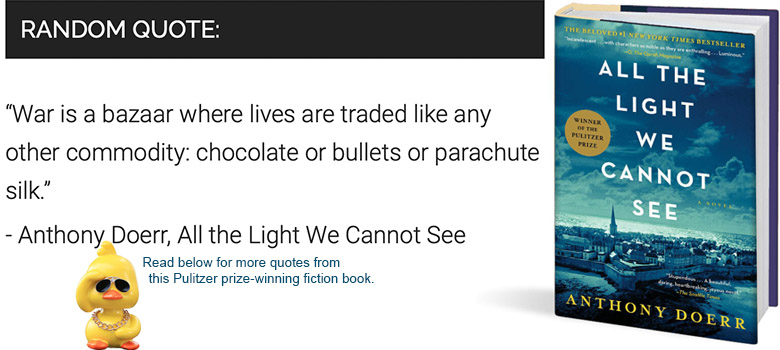“It’s steel country, anthracite country, a place full of holes. Smokestacks fume and locomotives trundle back and forth on elevated conduits and leafless trees stand atop slag heaps like skeleton hands shoved up from the underworld.” – p 24
“Night falls, autumn in 1936, and Werner carries the radio downstairs and sets it on the sideboard, and the other children fidget in anticipation. The receiver hums as it warms. Werner steps back, hands in pockets. From the loudspeaker, a children’s choir sings, ‘We hope only to work, to work and work and work, to go to glorious work for the country.’ Then a state-sponsored play out of Berlin begins: a story of invaders sneaking into a village at night.
All twelve children sit riveted. In the play, the invaders pose as hook-nosed department-store owners, crooked jewelers, dishonorable bankers; they sell glittering trash; they drive established businessmen out of work. Soon they plot to murder German children in their beds. Eventually a vigilant and humble neighbor catches on. Police are called: big handsome-sounding policemen with splendid voices. They break down the doors. They drag the invaders away. A patriotic march plays. Everyone is happy again.” – p 39
“…the air a library and the record of every life lived, every sentence spoken, every word transmitted still reverberating within it.”
“Radio: it ties a million ears to a single mouth.”
“The Frenchman’s voice is velvet. His accent is very different from Frau Elena’s, and yet his voice is so ardent, so hypnotizing, that Werner finds he can understand every word…
Open your eyes, concludes the man, and see what you can with them before they close forever, and then a piano comes on, playing a lonely song that sounds to Werner like a golden boat traveling a dark river, a progression of harmonies that transfigures Zollverein: the houses turned to mist, the mines filled in, the smokestacks fallen, an ancient sea spilling through the streets, and the air streaming with possibility.” p 48-49
“We all come into existence as a single cell, smaller than a speck of dust. Much smaller. Divide. Multiply. Add and subtract. Matter changes hands, atoms flow in and out, molecules pivot, proteins stitch together, mitochondria send out their oxidative dictates; we begin as a microscopic electrical swarm. The lungs the brain the heart. Forty weeks later, six trillion cells get crushed in the vise of our mother’s birth canal and we howl. Then the world starts in on us.”
“I have been feeling very clearheaded lately and what I want to write about today is the sea. It contains so many colors. Silver at dawn, green at noon, dark blue in the evening. Sometimes it looks almost red. Or it will turn the color of old coins. Right now the shadows of clouds are dragging across it, and patches of sunlight are touching down everywhere. White strings of gulls drag over it like beads. It is my favorite thing, I think, that I have ever seen. Sometimes I catch myself staring at it and forget my duties. It seems big enough to contain everything anyone could ever feel.”
“Don’t you want to be alive before you die?”
“Time is a slippery thing: lose hold of it once, and its string might sail out of your hands forever.”
“You know the greatest lesson of history? It’s that history is whatever the victors say it is. That’s the lesson. Whoever wins, that’s who decides the history. We act in our own self-interest. Of course we do. Name me a person or a nation who does not. The trick is figuring out where your interests are.”
“Consider a single piece glowing in your family’s stove. See it, children? That chunk of coal was once a green plant, a fern or reed that lived one million years ago, or maybe two million, or maybe one hundred million. Can you imagine one hundred million years? Every summer for the whole life of that plant, its leaves caught what light they could and transformed the sun’s energy into itself. Into bark, twigs, stems. Because plants eat light, in much the way we eat food. But then the plant died and fell, probably into water, and decayed into peat, and the peat was folded inside the earth for years upon years—eons in which something like a month or a decade or even your whole life was just a puff of air, a snap of two fingers. And eventually the peat dried and became like stone, and someone dug it up, and the coal man brought it to your house, and maybe you yourself carried it to the stove, and now that sunlight—sunlight one hundred million years old—is heating your home tonight.”
“A girl got kicked out of the swimming hole today. Inge Hachmann. They said they wouldn’t let us swim with a half-breed. Unsanitary. A half-breed, Werner. Aren’t we half-breeds too? Aren’t we half our mother, half our father?”
“Live faithfully, fight bravely, and die laughing.”
